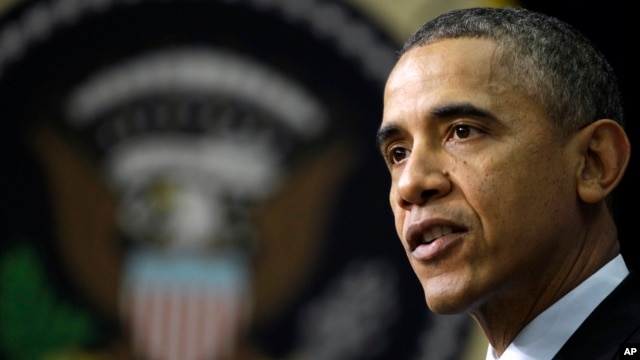M WAQAR..... "A man's ethical behavior should be based effectually on sympathy, education, and social ties; no religious basis is necessary.Man would indeed be in a poor way if he had to be restrained by fear of punishment and hope of reward after death." --Albert Einstein !!! NEWS,ARTICLES,EDITORIALS,MUSIC... Ze chi pe mayeen yum da agha pukhtunistan de.....(Liberal,Progressive,Secular World.)''Secularism is not against religion; it is the message of humanity.'' تل ده وی پثتونستآن
Monday, December 2, 2013
Obama Ups US Contribution to Global AIDS Fund
Marking the 25th annual observance of World AIDS Day, President Barack Obama said his administration remains committed to the global fight against AIDS. He also announced an increase in the potential total U.S. contribution to the Global Fund to Fight AIDS, Tuberculosis and Malaria.
The observance brought together the president and other U.S. officials, including Secretary of State John Kerry and Secretary of Health and Human Services Kathleen Sebelius.
Obama reflected on how far the fight against HIV/AIDS has come since the devastation of the early days of the epidemic. He announced that a major goal of the PEPFAR (The President's Emergency Plan For AIDS Relief) program, begun by his predecessor, George W. Bush, had been achieved.
"Two years ago, I set new prevention and treatment targets for PEPFAR, like increasing the number of mothers we reach so that we prevent their children from becoming infected, and helping six million people get treatment by the end of 2013," he said. "Today, I’m proud to announce that we’ve not only reached our goal, we’ve exceeded our treatment target. So we’ve helped 6.7 million people receive lifesaving treatment. And we’re going to keep at it."
The president has faced criticism from AIDS and health activists over what they call lagging U.S. contributions to PEPFAR, down 12 percent since 2010. PEPFAR began in 2003 with a $15 billion U.S. commitment.
Obama said his administration has not just sustained PEPFAR efforts but "expanded them," and he noted efforts to ensure that contributions from other donors match those from the United States.
During the president's first term, the U.S. pledged $4 billion to the Global Fund. For the current fiscal year budget, Obama requested $1.65 billion -- conditional on other donors stepping up contributions.
Over the next three years, Obama said the U.S. will contribute $1 for every $2 pledged by donors, up to a potential total of $5 billion. He urged donors attending the Global Fund meeting in Washington not to "leave money on the table" and said the U.S. will remain a global leader in the fight against AIDS.
"We will stand with you every step of this journey until we reach the day that we know is possible, when all men and women can protect themselves from infection; a day when all people with HIV have access to the treatments that extend their lives; the day when there are no babies being born with HIV or AIDS, and when we achieve, at long last, what was once hard to imagine -- and that’s an AIDS-free generation," he said.
Secretary of State John Kerry said it is clear the world is "turning a very important corner" in the AIDS fight, but said the challenge ahead will require major continued commitments.
Kerry indirectly addressed criticism, saying achieving key goals of reducing infections, mortality and increasing access to treatment in Africa and elsewhere, were due to President Obama's insisting on "setting a new standard."
"The way that we have leveraged our commitments inspires greater contributions from other nations and we have shown, I think, therein, strategic leadership," he said.
Kerry cited South Africa, Rwanda and Namibia as examples of transitioning PEPFAR from providing direct aid to delivering support for "locally run and self-sustaining efforts."
Domestically, Obama announced his administration will redirect $100 million to the National Institutes of Health to develop a new generation of therapies to fight HIV and AIDS.
"The United States should be at the forefront of new discoveries into how to put HIV into long-term remission without requiring lifelong therapies, or better yet, eliminate it completely," he said.
Also in his remarks Monday, the president noted that his signature health insurance reform law, which has been plagued by serious flaws, provides for free AIDS testing. And he noted that the law bars companies from denying health coverage to Americans, including those infected with HIV.


No comments:
Post a Comment